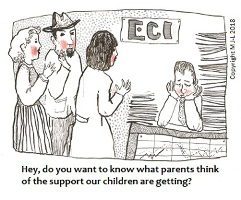Children with disabilities and special needs really belong to their parents. Do service providers know this?
 Editorial: I sometime wonder about this. I am sure many parents do too.
Editorial: I sometime wonder about this. I am sure many parents do too.
Two issues cause me concern about support for babies and young children:
The first is about asking parents how they experience the support that an agency provides for their child. The second is about involving local parents or parent representatives in discussions when service provision is discussed.
Managers of organisations that provide other sorts of services, for instance supermarkets and fitness clubs, spend a lot of time finding out what customers think about the service. They know that if they do not invest time in this, they could be missing opportunities to improve and failing to meet real needs. In my experience, many early childhood intervention (ECI) and early support services do not do this, or do not do it often enough or seriously enough. They then fall into the danger of relying on their own assumptions about what local infants and families need. In ignorance, they might be basking in a false picture of how much parents value the support provided.
This brings me to the second point. At many of the ECI seminars and conferences I have facilitated around the UK and other countries, there are few or no parents present. This is despite my appeals that professionals attending bring a parent with them. My motive in this is to give parents the chance to be present when ‘we’ are discussing support for ‘their’ children and because discussions are more grounded and more exciting when parents or parent representatives are present.
When I see empty chairs at these seminars or conferences, I wonder what has prevented parents sitting on them. Professionals tell me it is because parents are too busy, too tired, to locked-in to school start and finish times. This is true for very many parents, but not all. Parents do attend these events, often because someone, perhaps a professional or an agency, has made a special effort to help them be there. As in most aspects of family support in ECI, these access problems can be solved when there is a will.
I feel strongly about this. I compare it to a local meeting about race prejudice that excludes black people. Or a meeting about women’s rights that is organised and attended by men only. Parents of young children with special needs and/or disabilities should be brought to the fore when support systems are discussed – because it is parents who have the task of bringing up their children – because parents know more than professionals about their child, their family, their life, their needs – because parents pay taxes to fund public services and should have a strong voice in how they are shaped.
Do you feel brave? Organise a discussion day at which there will be a group of professionals from your ECI or early support service and a group (of a similar size) of parents whose children use or have recently used the service. Exciting! Choose a neutral facilitator. Aim for between 10 and 20 people.
When I have facilitated such events, there is typically polite discussion while everyone settles in and starts to feel safe. There might then be tears and anger as people get some things ‘off their chests’. Parents might cry as they voice their early experiences of their child and of being let down by service provision. Professionals might cry as they learn some of their assumptions about how to support children and families were wrong. The next phase can be professionals and parents beginning to see each other as human beings, stepping into each other’s shoes and being empathetic. The last phase can be some agreement about steps to take in service improvement, often with warm tears, smiles and hugs as the day ends.
 I have great faith in parents of children with special needs. I have great faith in the professionals whose job it is to support them. I have even more faith in what parents and professionals can achieve when they work together. A survey or a discussion day can be organised by professionals, by parents or as a joint exercise.
I have great faith in parents of children with special needs. I have great faith in the professionals whose job it is to support them. I have even more faith in what parents and professionals can achieve when they work together. A survey or a discussion day can be organised by professionals, by parents or as a joint exercise.
Peter Limbrick, February 2018
Cartoon is from TAC Bulletin issue 214

